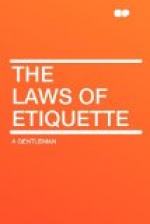In the house of another, or when there is any company present in your own, never converse with the servants. This most vulgar, but not uncommon, habit, is judiciously censured in that best of novels,—the Zeluco of Dr. Moore.
CHAPTER XIV. FASHION.
Fashion is a tyranny founded only on assumption. The principle upon which its influence rests, is one deeply based in the human heart, and one which has long been observed and long practised upon in every department of life. In the literary, the religious, and the political world, it has been an assured and very profitable conclusion, that the public,
“Like women, born to be controlled, Stoops to the forward and the bold.”
“Qui sibi fidit, dux regit examen,” is a maxim of universal truth. Pococurante, in Candide, was admired for despising Homer and Michel Angelo; he would have gained little distinction by praising them. The judicious application of this rule to society, is the origin of fashion. In despair of attaining greatness of quality, it founds its distinction only on peculiarity.
We have spoken elsewhere of those complex and very rare accomplishments, whose union is requisite to constitute a gentleman. We know of but one quality which is demanded for a man of fashion,—impudence. An impudence (self-confidence “the wise it call”) as impenetrable as the gates of Pandemonium—a coolness and imperturbability of self-admiration, which the boaster in Spencer might envy—a contempt of every decency, as such, and an utter imperviousness to ridicule,—these are the amiable and dignified qualities which serve to rear an empire over the weakness and cowardice of men.
To define the character of that which is changing even while we survey it, is a task of no small difficulty. We imagine that there is only one means by which it may be always described, viz., that it consists in an entire avoidance of all that is natural and rational. Its essence is affectation; effeminacy takes the place of manliness; drawling stupidity, of wit; stiffness and hauteur, of ease and civility; and self-illustration, of a decent and respectful regard to others.
A man of fashion must never allow himself to be pleased. Nothing is more decidedly de mauvais ton than any expression of delight. He must never laugh, nor, unless his penetration is very great, must he even smile; for he might by ignorance smile at the wrong place or time. All real emotion is to be avoided; all sympathy with the great or the beautiful is to be shunned; yet the liveliest feeling may be exhibited upon the death of a poodle-dog.
At the house of an acquaintance, he must never praise, nor even look, at the pictures, the carpets, the curtains, or the ottomans, because if he did, it might be supposed that he was not accustomed to such things.
About two years ago, it began to be considered improper to pay compliments to women, because if they are not paid gracefully they are awkward, and to pay them gracefully is difficult. At the present time it is considered dangerous to a man’s pretensions to fashion, in England, to speak to women at all. Women are voted bores, and are to be treated with refined rudeness.




